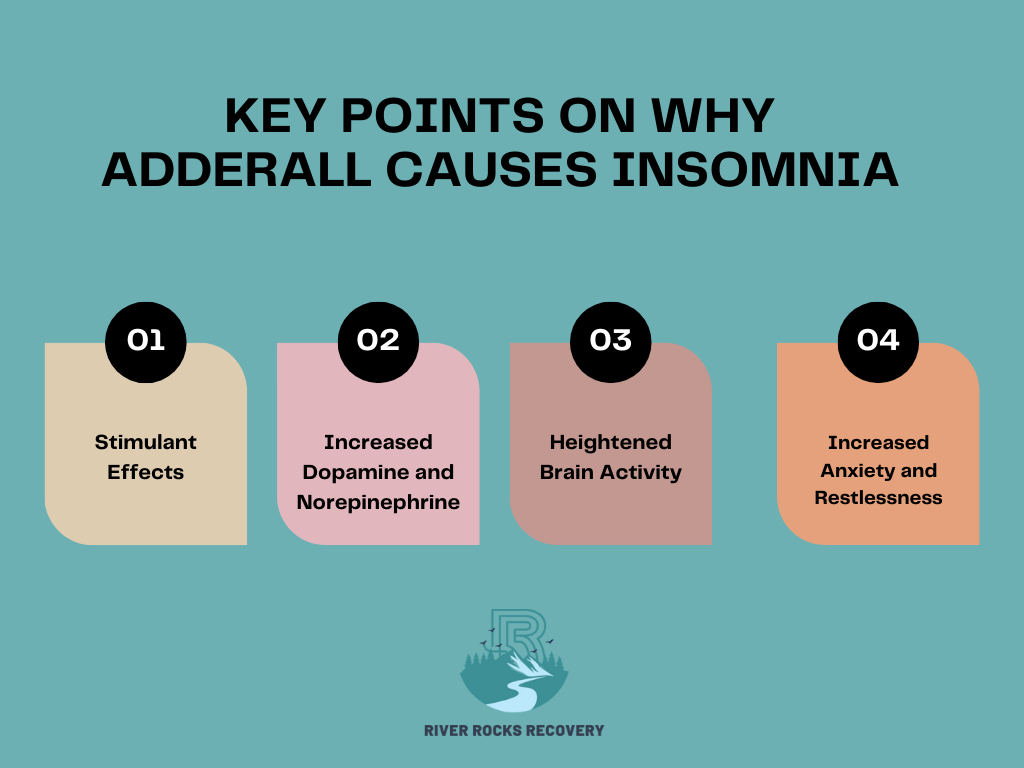Do you want to get rid of Insomnia caused by Adderall? Are you looking for effective tips that aid your sleeping pattern and give you a good night’s sleep without Adderall?
Adderall, a commonly prescribed medication for attention-deficit hyperactivity disorder (ADHD), enhances focus and attention by stimulating the central nervous system. However, sleeplessness is a common side effect of this potent stimulant. The insomnia that some people experience after using Adderall can be debilitating.
If you’re struggling with Adderall-induced insomnia, there are several effective strategies to help you manage this side effect while still benefiting from the medication. Thankfully, there are a few techniques you may do to lessen the effect on your sleep schedule. So, let’s scroll down this page and find some amazing tips for getting over Adderall-induced sleep deprivation.
Why Does Adderall Cause Insomnia?
Adderall is a stimulant that increases the levels of certain neurotransmitters, including dopamine and norepinephrine, in the brain. While this boost can enhance alertness, attention, and focus, it can also make it difficult for your brain to wind down at the end of the day, leading to sleep disturbances.
Some factors that may contribute to Adderall-induced insomnia include:
- Taking Adderall too late in the day: The effects of Adderall can last for hours, so taking it too late can disrupt sleep.
- Higher doses of Adderall: Increased dosages may intensify side effects like restlessness and insomnia.
- Individual sensitivity to stimulants: Some people are more sensitive to stimulants than others, making them more prone to insomnia.

Effective Strategies that Help You Overcome Sleep Deprivation
If you’re having trouble getting enough sleep after taking Adderall, you should see a doctor. To improve your quality of sleep, they may adjust your prescription or investigate other possible reasons why you aren’t sleeping.
However, to improve your quality of sleep, there are a few more strategies to psychologically get ready for bed. Many of these methods can also be beneficial if your ADHD symptoms are making your mind race.
1.Adjust Your Medication Timing
One of the simplest ways to reduce insomnia caused by Adderall is to adjust the timing of your dosage. Taking the medication earlier in the day gives your body more time to metabolize it, reducing its impact on your sleep at night.
Tips for Timing:
- Take Adderall early in the morning: Taking your medication as soon as you wake up allows the effects to wear off before bedtime.
- Avoid late afternoon doses: If you’re prescribed multiple doses, make sure the last one is taken in the early afternoon to prevent it from interfering with sleep.
- Extended-release formulations: Consider asking your doctor about extended-release (XR) formulations that provide a more gradual release of medication, minimizing nighttime
2. Create a Relaxing Bedtime Routine
Developing a calming routine before bed can help counteract the stimulating effects of Adderall. A consistent bedtime routine signals to your body that it’s time to wind down, making it easier to transition into sleep.
Ideas for a Relaxing Routine:
- Turn off screens: The blue light emitted from phones, computers, and tablets can interfere with melatonin production, a hormone that regulates sleep. Turn off screens at least 30 minutes before bed.
- Practice relaxation techniques: Engage in calming activities such as reading, deep breathing, or meditation to reduce stress and anxiety before sleep.
- Set a regular sleep schedule: Go to bed and wake up at the same time every day to help regulate your body’s internal clock, even on weekends.
3. Improve Your Sleep Environment
Your bedroom environment plays a critical role in how easily you fall asleep. By optimizing your space for comfort and relaxation, you can create a better environment for sleep.
Key Tips for a Sleep-Friendly Space:
- Keep your room cool: A cooler room temperature is often more conducive to sleep. Aim for 60-67°F (15-19°C).
- Limit noise and light: Use blackout curtains to block out light and earplugs or white noise machines to minimize disruptive sounds.
- Invest in a comfortable mattress and pillows: Ensure that your mattress and pillows provide adequate support to encourage better sleep posture.
4. Pay Attention to Your Diet
Your ability to fall asleep can be strongly impacted by the food and beverages you consume. The stimulating effects of Adderall can be enhanced by caffeine, sweets, and large meals in the late afternoon. Rather, choose foods that promote sleep, such as almonds, bananas, or herbal teas that contain relaxing herbs like valerian root or chamomile.
5. Think About Sleep Aids With Doctor
Sleep aids, whether natural or pharmaceutical, may be beneficial for certain people. Solutions such as melatonin pills can assist in resetting your circadian rhythm. To prevent potential interactions, you should, however, always speak with your doctor before starting any new vitamins or drugs, especially if you’re using Adderall.
6. Limit Caffeine and Other Stimulants
Caffeine and other stimulants can worsen Adderall-induced insomnia. If you’re already taking a stimulant medication, consuming additional stimulants during the day can further disrupt your ability to sleep.
How to Manage Caffeine:
- Cut out afternoon caffeine: Avoid consuming caffeine after noon to give your body enough time to eliminate it before bedtime.
- Monitor your overall stimulant intake: In addition to caffeine, be mindful of other stimulants, such as energy drinks and nicotine, which can also affect sleep quality.
7. Engage in Cognitive Behavioral Therapy
Mental health treatment of sleep disturbances, particularly those brought on by medication, can be effectively handled with CBT-I. This therapy method makes it simpler to cure insomnia by teaching techniques like sleep restriction and sensory management, as well as helping you reframe negative beliefs about sleep.
8. Establish a Sleep-Friendly Ambience
Your ability to fall and stay asleep is greatly influenced by the conditions in your bedroom. Maintain the space calm, dark, and cold. If outside circumstances are interfering with your quality of sleep, think about utilizing earplugs, white noise machines, or blackout curtains.
9. Speak with Your Doctor
If you continue to struggle with insomnia despite making these adjustments, it’s important to consult your doctor. They can help you explore alternative options, such as:
- Adjusting your Adderall dosage: Lowering the dosage or switching to a different stimulant may reduce insomnia.
- Changing medications: Your doctor may suggest trying a different medication for ADHD that doesn’t disrupt sleep as much.
- Short-term sleep aids: Prescription sleep aids may be considered for short-term use while your body adjusts to Adderall.
Need Professional help for Adderall addiction? Call River Rocks Recovery!
Here at River Rocks Recovery, we provide all-inclusive addiction treatment programs customized specifically for you, giving you back control over your life. Our knowledgeable staff will support you during your rehabilitation with evidence-based techniques and empathetic care. Make contact with us right now to start the healing process!
Conclusion
Overcoming insomnia caused by Adderall is possible with the right approach. By adjusting medication timing, improving your sleep habits, managing stress, and making lifestyle changes, you can enjoy the benefits of your ADHD treatment while still getting restful sleep.
If insomnia persists, it’s important to consult addiction treatment center to ensure that both your sleep and ADHD symptoms are properly managed. With a thoughtful plan, you can regain control of your sleep and maintain your well-being. Call us today at: (888) 905-6281.
FAQs: How to Overcome Insomnia Caused by Adderall
How can Adderall cause insomnia?
Adderall can cause insomnia by:
- Stimulating the central nervous system: Adderall can make it difficult to relax and fall asleep.
- Interfering with sleep cycles: Adderall can disrupt the body’s natural sleep-wake cycle.
- Increasing anxiety or stress: Adderall can sometimes worsen anxiety or stress, which can make it difficult to sleep.
Should I talk to my doctor about my insomnia?
Yes, it’s important to talk to your doctor about your insomnia. They may be able to adjust your Adderall dosage or prescribe a sleep aid to help you sleep better.
Can I stop taking Adderall if I’m having trouble sleeping?
Do not stop taking Adderall abruptly without consulting your doctor. Stopping Adderall suddenly can cause withdrawal symptoms. If you’re having trouble sleeping, your doctor may be able to adjust your dosage or prescribe a different medication.
Should I consider switching to a different ADHD medication?
If you’re experiencing significant insomnia despite trying various strategies, your doctor may recommend switching to a different ADHD medication. Some medications may have a lower risk of insomnia.
When should I seek professional help for insomnia?
If your insomnia persists despite your best efforts, or if it is significantly affecting your daily life, it’s important to seek professional help. A sleep specialist can help you identify the underlying cause of your insomnia and develop a addiction therapy program.





























